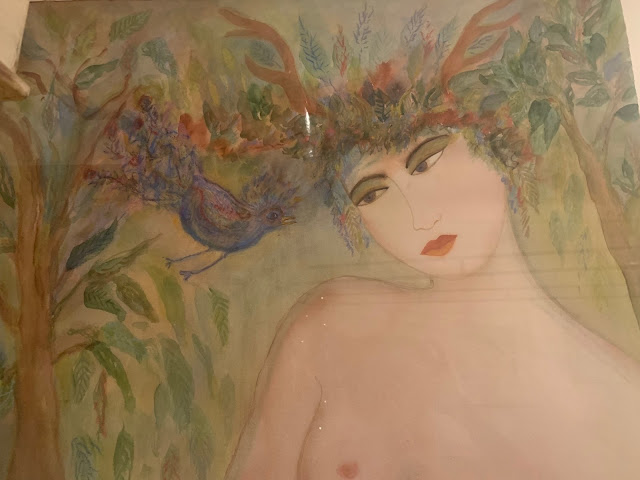Maestro Leon Botstein congratulates soprano Angela Meade
In yesterday's discussion of the various forms of opera available to New Yorkers, we neglected to mention a most important one--that of the concert presentation as exemplified by the American Symphony Orchestra as well as New Amsterdam Opera. As a matter of fact, our first exposure to opera came through Eve Queler's Opera Orchestra of New York. We recall sitting up in the 4th balcony, following along with the libretto and forming our taste in opera.
There are benefits and drawbacks to concert presentations of operas. There are rarely titles and following along with the libretto, as our companion did, may help you identify the characters and appreciate the linguistic and diction skills of each individual singer. However, it also deprives you of the opportunity to focus on the music and the voices. In the context of a staged opera there is plenty of drama and characterization to focus on as one can observe body movement in service of those aspects. Sadly, this is missing in a concert presentation.
Last night, at American Symphony Orchestra's concert production of Richard Strauss' first opera Guntram, for which the composer wrote his own libretto, we chose to focus on the aural experience. Given our lack of familiarity with the rather inert story we were happy to focus on the orchestral writing until a bit of singing captivated our ear.
After Guntram's modest success in 1894 in Weimar, it flopped in Munich the following year and was forgotten until recently. Musicologists blame its lack of success on its purported similarity to Wagner's opus. Indeed, perhaps the music world had heard enough about Medieval minnesingers, sin, and redemption. Although we have never thrilled to Parsifal and Tannhaüser, we have experienced no end of delight from Die Meistersinger von Nürnberg with its more captivating story.
We very much enjoyed Strauss' orchestral writing for Guntram and if there were echoes of Wagner, they were of Wagnerian innovations that we favor. We particularly enjoyed the opening leitmotiv that reappeared in various forms throughout the opera, a rhythmically memorable descending pattern that Strauss renewed throughout the work in different keys, providing unity to the work.
The orchestral writing was indeed lavish and lavishly orchestrated. Had it been a symphony we would not have missed the voices. However, it was an opera and there were voices, all of them at least serviceable but often thrilling. In the only opera Strauss wrote with the male role as the most important, we must say that it was soprano Angela Meade who ran away with the honors.
Entering the stage in a gilded gown, she appeared like the Greek god Helios, drawing his golden chariot across the sky. Her voice, similarly, seems a gift from the gods--strong and gleaming when called for yet tender in the final love scene with the eponymous Guntram, sung by tenor John Matthew Myers. The role of Guntram is extremely demanding with long arias in each of three acts. Prior to the final scene we found Mr. Myers' voice somewhat irritating and forced in the upper registers, although far more agreeable in the middle and lower ranges. (The mighty Strauss orchestra, conducted by Maestro Leon Botstein, is rather a beast to be heard over but Ms. Meade's steely soprano cut right through the dense orchestration.) However, we must admit that in the final scene of love and renunciation, Mr. Myers' voice sounded much more musical, perhaps inspired by the tenderness of the love he felt compelled to renounce. Or perhaps, he had just been saving himself for the end.
Bass-baritone Kevin Short sang the role of Freihild's father, the Old Duke, and impressed with his deep resonance. As the wicked Duke Robert we heard baritone Alexander Birch Elliott, as unpleasant a character as one might imagine. Indeed, the opera begins with his wife Freihild running toward the lake to drown herself and one could truly understand why.
As we learned from reading the synopsis, Freihild and Guntram are birds of a feather whose mutual empathy is understandable. Too bad that Guntram kills Robert and decides to spend the rest of his life in solitary atonement--not because he murdered but because he "sinned in his heart" by loving a married woman! Perhaps there are some out there who might find this story worthy of a staged production but we do not.
Aside from the final scene of love and renunciation, there were a few vocal moments that took our attention away from the instrumentals. One was a chorus of four men whose voices combined and intertwined in the most delicious harmonies. Unfortunately, since we were not following along with the libretto, we are unable to identify them. Nor are we able to identify a male singer who came on for a brief aria on stage right and sang with beautiful clarity of tone. If you were there and can say who the singer was, please leave a comment below.
Mezzo-soprano Katherine Goeldner put in a brief appearance in Act I as an old woman with tenor Bernard Holcomb as an old man. Bass-baritone Nate Mattingly sang the role of Friedhold.
Thanks to the American Symphony Orchestra for giving us this opportunity to hear some gorgeous orchestral writing and for giving us the gift of Ms. Meade. We wouldn't have missed it for the world!
© meche kroop



